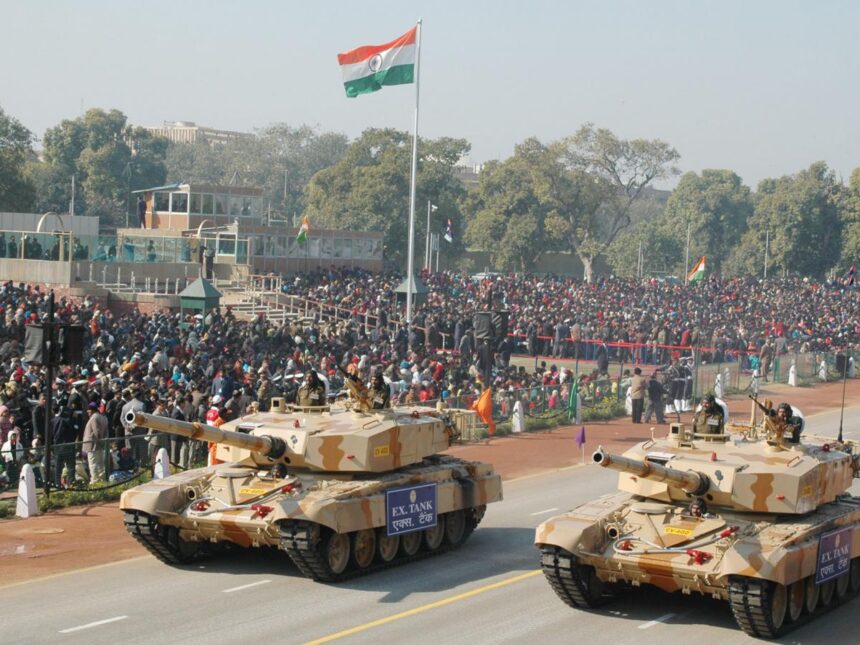The tensions between India and Pakistan have increased after a mortal terrorist attack administered by India that charged 26 lives, including 25 Indian citizens and a Nepalese tourist. The Attack Toke Place in the popular tourist city of Pahalgam on April 22, 2025, and has been described as the most devastating for civilians in the region since the attacks of Mumbai 2008.

Photo: Press Information Office on behalf of the Ministry of Defense, the Government of India has a license under the open data license of the Government – India (Godl)
Indian tanks
According to the reports, the assault was made by a previously little known group called Kashmir resistance, he believed that he had links with Lashkar-E-Taiba and Hizbul Mujahideen, based in Pakistan. The incident has revived long -standing hostilities between the two neighbors with nuclear weapons.
India response
Following the attack, Indian Prime Minister Narendra Modi He condemned him strongly, calling him an “atrocious act” and committing to chase perpetrators wherever they may be. The Indian government accused Pakistan of housing the attackers and identified two suspects as a Pakistani national affiliated with Lashkar-E-Taiba.
In a strongly written statement, the Indian Prime Minister Narendra Modi Warned:
“India will identify, hunt and punish all terrorists, their supporters and their agents. We will chase them until the end of the earth.”
As part of his immediate response, India has tasks of a series of diplomatic and strategic steps:
- Diplomatic relations with Pakistan have been degraded, including the withdrawal of defense personnel and a reduction in the embassy staff;
- India suspended its participation in the Indo Water Treaty, a fundamental water exchange agreement since 1960;
- The only land border crossing between the two countries has been closed, and all visas issued to Pakistani citizens have been revoked;
- India has also intensified the security measures in Jammu and Kashmira and has released a national human hunt for those involved in the attack.
India has deployed its R11 Vikrant aircraft bearer To the western coast of the Arabic Sea, pointing out a great sample of force in response to the increase in regional tensions. Simultaneusly, Pakistan is a preparation to perform missile tests in the Arabian sea region of the Indian Ocean. These actions mark a significant escalation in military activity throughout the area.
Pakistan reaction
Pakistan has categorically denied any participation in the attack and demanded that India provide concrete evidence. In retaliation for the diplomatic movements of India, Pakistan closed their airspace to the Indian airlines and stopped all bilateral trade. The Pakistani government also reduced its diplomatic presence in India and issued warnings that any threat to its sovereignty or interference with its water resources would be considered acts of war.
In Islamabad, the National Security Committee of Pakistan (NSC), chaired by Prime Minister Shehbaz Sharif, held an emergency meeting to address India’s accusations with respect to Pahalgam’s recent attack in Cashmira and the Indian Ocean managed by India.
Key decisions of today’s NSC meeting in Islamabad:
- Pakistan rejected India’s accusations as “motivated policies” and “legally unfounded.”
- All SAARC visas for Indian citizens have been suspended, except SIJ religious pilgrims.
- Wagah’s border crossing has been closed, and Indian military and defense advisors have been expelled.
- The Suspension of India of the Treaty of the Waters of the Indo was considered “an act of war”; Pakistan promised to defend his water rights “at any cost.”
- Access to trade and airspace for Indian carriers has stopped completely.
- Pakistan reserves the right to suspend the Simla Agreement and other bilateral agreements if tensions intensify.
- Pakistan also accused India or “systematic oppression” in Kashmir and “terrorism sponsored by the State” in the Pakistani soil, referring to the case of Kulbhushan Jadhav as proof of Indian intelligence operations in Pakistan.
Islamabad promised “strong retaliation measures” if Pakistan’s sovereignty is a challenge.
Broader implications
The Suspension of India of the Treaty of the Water of the Indo has a serious risk for the agricultural and dependent water industries of Pakistan, especially given its ongoing economic struggles. Historically, the treaty has been seen as one of the most successful water exchange agreements and a rare point of cooperation between the two adversaries.
The international reaction has been rapid. Countries like the United States, the United Kingdom and China have expressed concern about the intensive situation and urged both parties to exercise a re -laughed. Diplomatic observers warn that, unless tensions are quickly discouraged, the region could approach a complete conflict.
Perspective
The April 22 attack has revived one of the most volatile rivalries in southern Asia, pushing India and Pakistan on the edge of a new crisis. While both governments face pressure to act decisively, greater climbing could have serious consequences not only for bilateral relations but also for regional and global stability. The next few days will be critical to determine if diplomacy can prevail or if the subcontinent is aimed at another conflict period.
Detailed
PAHALGAMA (URDU pronunciation: [pɛɦɛlɡɑːm]) Works Council PAHALGOM (Kashmir pronunciation: [pəhəlʲɡoːm]) It is a city in the Anantnag district of the territory of the Indian Union of Jammu and Kashmir. It is located on the banks of the Lidder river to an altitude or 2,200 m (7,200 feet) in the Cashmiro Valley. Pahalgam is the headquarters of Pahalgam Tehsil, one of the eleven tehsils in the Anantnag district. Located about 45 km (28 miles) from Anantnag, the city is a popular tourist destination and hill station. The city is the starting point of the annual pilgrimage to the AmarNath temple, which takes place in July to August.
>












